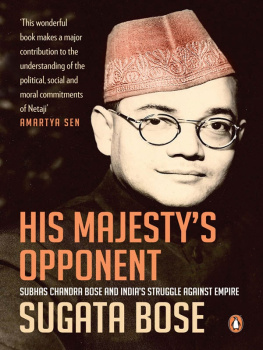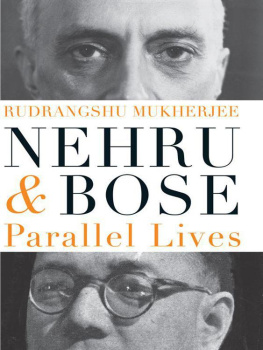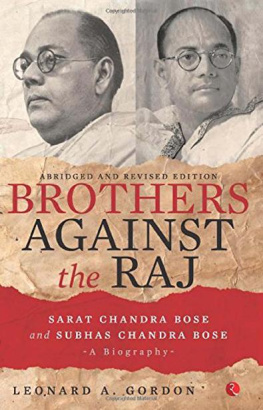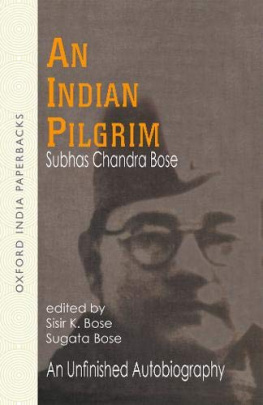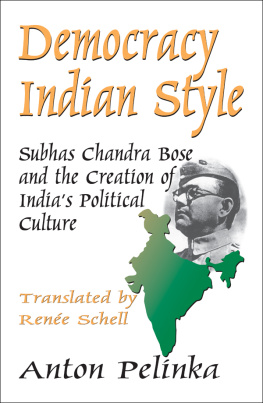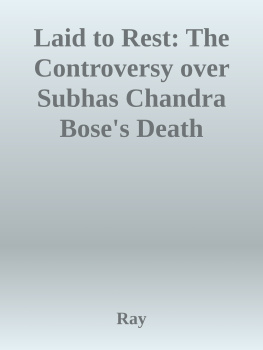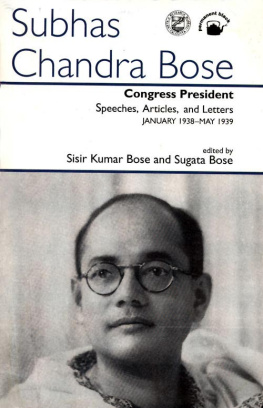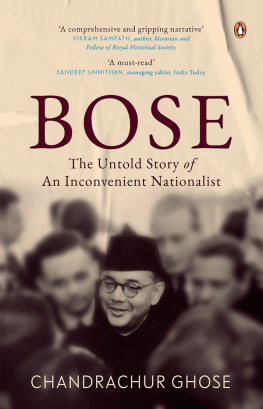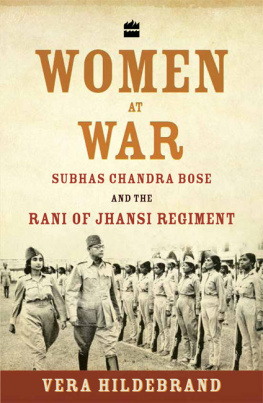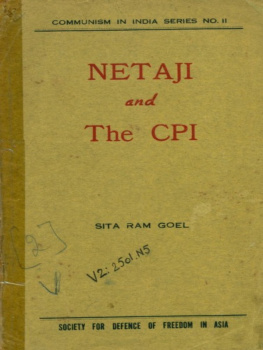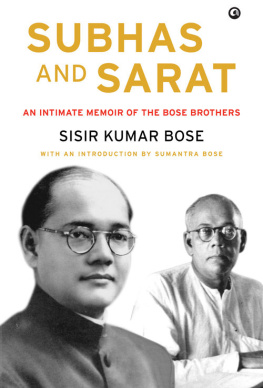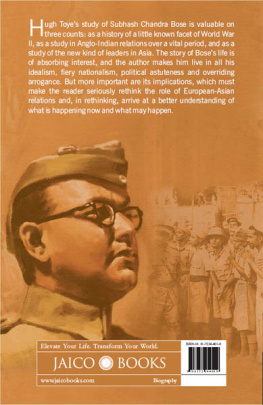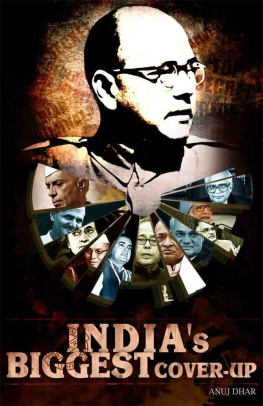Bose Subhas Chandra - His Majestys Opponent: Subhas Chandra Bose and Indias Struggle Against Empire
Here you can read online Bose Subhas Chandra - His Majestys Opponent: Subhas Chandra Bose and Indias Struggle Against Empire full text of the book (entire story) in english for free. Download pdf and epub, get meaning, cover and reviews about this ebook. City: New Delhi, year: 2013, publisher: Penguin Books Ltd, genre: Politics. Description of the work, (preface) as well as reviews are available. Best literature library LitArk.com created for fans of good reading and offers a wide selection of genres:
Romance novel
Science fiction
Adventure
Detective
Science
History
Home and family
Prose
Art
Politics
Computer
Non-fiction
Religion
Business
Children
Humor
Choose a favorite category and find really read worthwhile books. Enjoy immersion in the world of imagination, feel the emotions of the characters or learn something new for yourself, make an fascinating discovery.
- Book:His Majestys Opponent: Subhas Chandra Bose and Indias Struggle Against Empire
- Author:
- Publisher:Penguin Books Ltd
- Genre:
- Year:2013
- City:New Delhi
- Rating:4 / 5
- Favourites:Add to favourites
- Your mark:
- 80
- 1
- 2
- 3
- 4
- 5
His Majestys Opponent: Subhas Chandra Bose and Indias Struggle Against Empire: summary, description and annotation
We offer to read an annotation, description, summary or preface (depends on what the author of the book "His Majestys Opponent: Subhas Chandra Bose and Indias Struggle Against Empire" wrote himself). If you haven't found the necessary information about the book — write in the comments, we will try to find it.
His Majestys Opponent: Subhas Chandra Bose and Indias Struggle Against Empire — read online for free the complete book (whole text) full work
Below is the text of the book, divided by pages. System saving the place of the last page read, allows you to conveniently read the book "His Majestys Opponent: Subhas Chandra Bose and Indias Struggle Against Empire" online for free, without having to search again every time where you left off. Put a bookmark, and you can go to the page where you finished reading at any time.
Font size:
Interval:
Bookmark:



PENGUIN BOOKS
Sugata Bose is the Gardiner Professor of History at Harvard University. He was educated at Presidency College, Calcutta, and the University of Cambridge where he obtained his PhD and was later a Fellow of St Catharines College. Before taking up the Gardiner Chair at Harvard in 2001, he was Professor of History and Diplomacy at Tufts University. Bose was a recipient of the Guggenheim Fellowship in 1997 and gave the G.M. Trevelyan Lecture at the University of Cambridge.
Bose, who is the grandson of Netajis brother Sarat Chandra Bose, is the author of many books including Peasant Labour and Colonial Capital and the much-acclaimed A Hundred Horizons: The Indian Ocean in the Age ofGolden Empire. He has also made documentary films on South Asian history and politics and published recordings of his translations of Tagore.
PRAISE FOR THE BOOK
His Majestys Opponent offers a multifaceted portrait of Subhas Chandra Bose. It presents a captivating account of the life of an intellectual and a cosmopolitan, a revolutionary and a misled nationalistTimes LiterarySupplem ent
[A] fine, nuanced book... It is sympathetic but dispassionate and evokes in the reader just the right mix of emotion and regret that Boses brilliant but truncated life deservesHindustan Times
Sugata Boses book has filled a long-standing gap for an authentic biography of Netaji Subhas Chandra BoseStatesman
In terms of sheer craftsmanship and mastery over material, [His MajestysOpponent] is an achievement that will evoke the admiration and envy of any historian-biographerTelegraph
Bose has used this accessible style to deconstruct a man who we have pigeon-holed as either a warrior hero, or as a nave nationalist who flirted with the forces arrayed against hum an rightsMail Today
His Majestys Opponent is a comprehensive biography, meticulously researched and elegantly writtenBusiness Standard
[A] groundbreaking work that seeks to tell the story of Netajis life, situating him in the context of sub-continental as well as world history at the same timeDaily Star
[Boses] impeccable scholarship is in full viewBusiness Line
Lucid in style, brilliant in political analysis, objective in approach... the book gives us a picture of the politics in India of the 20s and 30s with detachment that is admirable as it is formidableFree Press Journal
But Sugata Bose has achieved [a] critical distance... This biography reveals a lot more about Subhas Boses intimate life than did the stuffy portrayals in some earlier accountsBiblio
[Bose] presents an admirably restrained account of this flawed patriot. Making good use of the family archives, he reaches out to the widest possible audience with a compelling narrative that sacrifices none of its authors academic credentialsLiterary Review
[W]ritten with energy and without sacrificing the historical details... the book offers an intimate portrait of Netaji not only as a revolutionary leader but also a loving husband, a man of letters, and an untiring believer in communal amityRediff.com
In a remarkable narrative that pairs political passion with historical precision, Sugata Bose has beautifully explored the character and charisma of the man, while providing an elegant and incisive account of one of the most important phases of the struggle for Indian independenceHomi K. Bhabha, author of The Location of Culture
In honor of Sisir Kumar Bose (19202000)
Subhas Chandra Bose was an uncle of my father, Sisir Kumar Bose, and a younger brother of my paternal grandfather, Sarat Chandra Bose. I never met Subhas Chandra Bose, since he passed from the scene in 1945, a good eleven years before I was born. I never met Sarat Chandra Bose either; he died in 1950. Growing up during the early decades of independent India, I knew them not as relatives but as historical public figures. Like millions of other South Asians, I thought of Subhas Chandra Bose as NetajiRevered Leaderone of those who spearheaded Indias freedom struggle. I was also aware of how controversial he was in the West, because of his wartime alliances. According to my father, Netaji believed that his family was coterminous with his country. I was taught, from childhood, never to claim a special relationship with him based on an accident of birth.
Though I belong to a generation that never knew Netaji in person, I had the opportunity to meet the men and women who had worked closely with him. They were frequent visitors and guests at my familys home in Calcutta, first at 1 Woodburn Park, and after 1974 at 90 Sarat Bose Road (the house we called Basundhara). Sitting on the verandah of Woodburn Park, I heard Abid Hasan recount the thrilling story of the hazardous submarine voyage he took with Netaji in 1943. S. A. Ayer told many vivid anecdotes about Netajis time in Singapore and Rangoon, including the process of writing the proclamation of the provisional government of free India. Another visitor, Lakshmi Sahgal, described the formation of the womens regiment of the Indian National Army in 1943. Janaki Thevar Athinahappan spoke of the regiments retreat with Netaji from Burma to Thailand in 1945. The battles fought in Imphal, Kohima, and Burma came alive in the words of Prem Kumar Sahgal, Gurbaksh Singh Dhillon, Abid Hasan, Mehboob Ahmed, and many others. Their voices became thick with emotion whenever they spoke about Netaji, and they wept for their lost leader decades after he was gone.
One afternoon in early December 1940, Netaji called my father to his side and inquired, Amaar ekta kaj korte parbe? The kaj (work) that my father was being asked to do was to help his uncle escape from British-ruled India. From that day on, my father never stopped doing Netajis work. Despite his busy professional life as one of Indias leading pediatricians, he was deeply committed to upholding the best traditions of Indias freedom struggle. In 1957, he established the Netaji Research Bureau (NRB)an institute devoted to history, politics, and international relationsin Netajis ancestral house at 38/2 Elgin Road. I grew up in tandem with that institution, to which he devoted far more time and attention than to his children.
I did not fully appreciate the scale of my fathers achievement until I turned to writing this book. Through half a century of dedicated effort, he had managed to collect a trove of documents, letters, manuscripts, relics, memoirs, photographs, voice recordings, and film footage connected to Netaji and the Indian independence movementmaterials gathered from all corners of Asia and Europe and beyond. Though I have made extensive use of archives in London, Delhi, and elsewhere, no truly substantive biography of Netaji would have been possible without the priceless resources available at the Netaji Research Bureau. I remember with much fondness its first archivist, Naga Sundaram, who as a young civilian recruit in the Indian National Army had fought at the Battle of Imphal, and Benode Chandra Chaudhuri, who in the NRBs early decades ran its publications division with unflagging zeal. During my research and writing of this book Kartik Chakrabarti, Sukhamoy Chowdhury, and Manohar Mondal cheerfully responded to my endless demands for source materials of every kind from the NRB archives. This is the first book I have written in Calcutta. I wrote during the day at 38/2 Elgin Road and during the night at 90 Sarat Bose Road.
Font size:
Interval:
Bookmark:
Similar books «His Majestys Opponent: Subhas Chandra Bose and Indias Struggle Against Empire»
Look at similar books to His Majestys Opponent: Subhas Chandra Bose and Indias Struggle Against Empire. We have selected literature similar in name and meaning in the hope of providing readers with more options to find new, interesting, not yet read works.
Discussion, reviews of the book His Majestys Opponent: Subhas Chandra Bose and Indias Struggle Against Empire and just readers' own opinions. Leave your comments, write what you think about the work, its meaning or the main characters. Specify what exactly you liked and what you didn't like, and why you think so.

